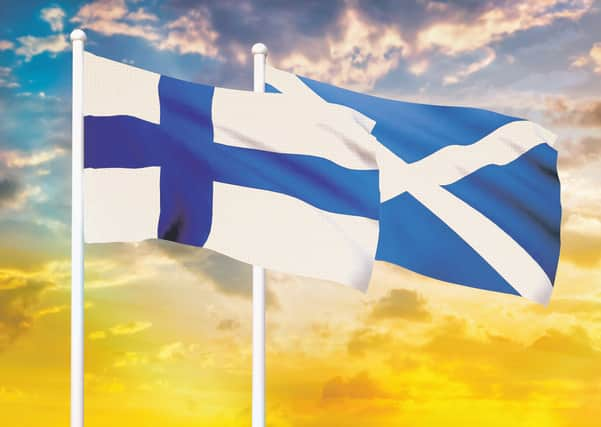Alistair Heather: Why Finns believe Scotland could become Nordic nation number six


The Finnish newspaper has twice the circulation of the Guardian, and has tremendous traction within opinion-forming circles. So it’s worth us taking the question seriously. Could Scotland ever really become the sixth Nordic nation?
The Scottish Government seems to think so. In 2017, All Points North, the Scottish Government’s Nordic policy statement emerged. It outlined its ambitions for learning from and connecting to our Northern European neighbours. Finland was the nation from which Scotland borrowed the hugely successful Baby Box concept to welcome new bairns. This Finnish idea is now a formative part of every new Scottish family’s lived experience.
Advertisement
Hide AdAdvertisement
Hide AdAnother radical idea in the All Points North statement was that Scotland would “learn lessons from Finland’s pilot of a universal basic income”. Finland’s UBI trial paid 2,000 people €560 a month unconditionally for two years, and found positive impacts for mental wellbeing, and an increase in employment for those on the scheme. Nicola Sturgeon has now begun to proclaim that UBI is an idea “whose time has come”. Serious discussions around implementing it will take place “hopefully reasonably quickly” after the crisis phase of the coronavirus is passed, she says.
It’s not all one-way traffic. From 2018, schools in East Lothian and Espoo, an area of high-performing schools in Finland, have been taking part in knowledge exchanges. The Finns were “impressed” by “the practices for implementing the Curriculum of Excellence”.
Politically, then, there is a push for borrowing Nordic models. Culturally, too, there have been concerted efforts to connect, or reconnect us to our northern neighbours. Lesley Riddoch of this parish has written extensively on the theme. The Northern Arc music collective have regularly organised musical collaborations between Scottish and northern European acts. Our Northern Isles, as well as Sutherland and Caithness have their own bespoke relations to their Scandinavian neighbours. So there are connections here and there. But if you asked folk on the streets of Stranraer, Stockholm or Helsinki if Scotland is currently a Nordic country, I suspect you’d be given a fairly firm “No”.
Ideas of identity are unfixed, and Scotland’s self-image seems increasingly up for grabs.
There are plenty of stories for us to draw upon if we wish to emphasise our Nordic connections. Scots brought the industrial revolution to Finland. The Swedish army employed thousands of Scots. It was to Norway that many Jacobites fled after Culloden. Iceland’s first population had a huge Scottish contingent, with around two-thirds of the female settlers there being of Celtic stock, many travelling from northern Scotland. For this reason Iceland is, surprisingly, as hoachin with gingers as Sauchiehall Street.
I’ve spent a good chunk of time in Finland over the years, and I see them finding responses to issues we struggle with. How to administrate vast tracts of sparsely populated land. How to balance the needs of three distinct language communities within the nation. Alcoholism, poverty, isolation. Rebuilding cultural confidence after generations of cringe. There’s a tremendous amount to be discussed and learned, even if we aren’t currently independent.
It might sound fanciful that we could become Nordic. But it’s worth bearing in mind that Finland was not automatically part of the club when it achieved its independence. As the Helsingin Sanomat article notes: “In the 1920s Finland was still considered to be close to Russia or a Baltic country, but with perseverance pushed its way into the Nordic countries’ group.”
Is Scotland the sixth Nordic country? Not yet. But with will and perseverance, we certainly could be. The door on the far side of the North Sea is ajar.
Alistair Heather is a writer and broadcaster. His documentary on the Scots language, Rebel Tongue, is streaming now on the iPlayer
Comments
Want to join the conversation? Please or to comment on this article.